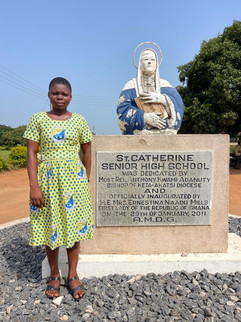Changemaker Series: Jennifer Quartey
- WC4E

- Jun 5, 2025
- 3 min read

Redefining Success for Rural Girls: The Story Behind Mbaa Tumi
Inspiration Story
My inspiration stems from a deeply personal experience as a CAMFED (Campaign for Female Education) Ghana beneficiary. At Gomoa Anyanful Junior High School, I was the only girl in my class to pass and receive sponsorship for Senior High School in 2013. This raised a lingering question: What happened to the other girls?
Many had enormous potential but faced systemic and social challenges, limited access to quality early education, and heavy household and childcare responsibilities, that hindered academic performance. By the time I completed SHS in 2016, some of my peers were already young mothers or enrolled in apprenticeships, unable to pursue further education due to grade-based barriers in scholarship programs.
Although CAMFED has since introduced entrepreneurship and skills training programs to support girls beyond academics, the gap still persists. When I joined Lead For Ghana in 2021, I committed to changing this narrative. Alongside my co-fellow, I launched what would become Mbaa Tumi (The Power of Women), an initiative supporting rural girls’ transition to secondary and technical education, free from the constraints of academic performance as the sole qualifier. Our mission is to amplify the unique talents and ambitions of girls and offer alternative, meaningful pathways to success.
How did WC4E impact your journey?
Discovering Women Changemakers for Education (WC4E) early in the Mbaa Tumi journey was a game-changer. Through the fellowship, I gained critical skill from grant writing to nonprofit registration, and received funding that made our pilot efforts possible.
Our first major support came through WC4E’s 2023 International Women’s Day grant, which allowed us to offer vocational training in donut making and liquid soap production. Several girls launched small businesses afterward. However, one parent's complaint that her daughter was prioritizing income generation over household chores taught us a valuable lesson: skill-building must go hand-in-hand with mentorship and guidance.
Beyond funding, WC4E equipped me with tools to pitch ideas, navigate nonprofit logistics, and connect with mentors. One of the most impactful parts of the fellowship was being matched with a personal mentor, someone who continues to guide me and remains an integral part of my growth.
What are the current highlights of your journey?
Mbaa Tumi is now on the cusp of official nonprofit registration in Ghana. Our impact is already visible:
Two pioneer scholars will graduate in July 2025 from Ave Technical Institute, specializing in Fashion, Design, and Technology.
Two others are currently studying at Mawuli Senior High School and Saint Catherine Senior High School in the Volta Region.
Two more girls are being partially sponsored to study at Ave Technical Institute.
These milestones signal real progress in breaking down barriers and creating opportunities for rural girls in education and vocational development.
What are your hopes and aspirations for the future?
I envision Mbaa Tumi reaching more rural girls, empowering them through education and technical training, free from the limitations of grade-based eligibility. Our long-term strategy includes establishing structured mentorship and financial support systems that nurture self-determined futures whether in higher education, skilled trades, or entrepreneurship.
Our sustainability model is community-centered: graduates who establish businesses will commit to sponsoring at least one other girl every three years. This cycle of support will gradually reduce reliance on external funding.
We also plan to establish an entrepreneurship center where graduates can refine their skills, gain employment, and generate income. This center will function as a production and innovation hub, with goods sold locally and internationally to fund operations and expand our reach.




















Comments